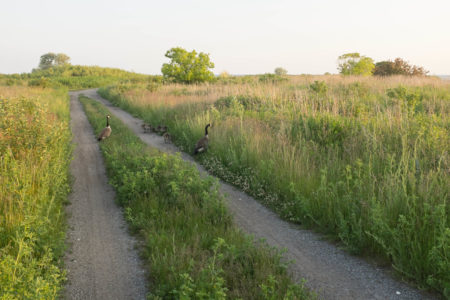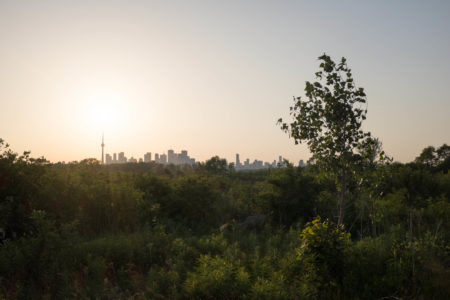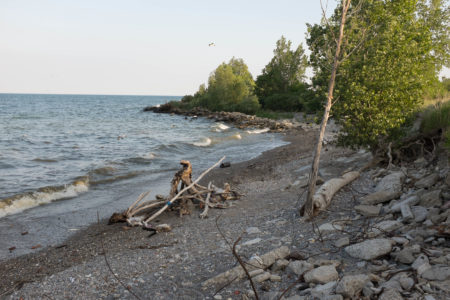Slides in academic presentations
I have seen hundreds of academic presentations, the great majority with slides. Unfortunately, I would say that the most common practice is one of the worst: putting all or nearly all of what you will say on your slides. Since nearly everybody reads faster than you will talk, this gives the whole presentation a dragging sense of going over the same ground slowly and repeatedly.
Putting totally different text on your slides is in some ways even worse, since now the audience needs to follow two simultaneous narratives which may not combine perfectly or benefit from being put forward in parallel.
The approach which I use and have found successful is to make myself a Powerpoint deck with speaking notes in point form. With the slides on a screen that only I can see, I can be sure to follow my overall outline and not miss any points. It also lets the audience concentrate fully on what I am saying, without the distraction of comparing it against text on slides. Generally I think it sounds more engaging and human to turn point form text into full sentences on the fly, rather than read a speech verbatim, but if the presentation is very short it can be best to have everything written succinctly in advance and then to try to read it in a way that doesn’t sound like a recitation.
A couple of ways to have slides with fewer problems are to only include very brief summary or conclusion text, which the audience will be able to read so quickly it isn’t a distraction, or using slides more-or-less exclusively to show charts, graphs, and photos. That is what I tried to do with my recent lesson on the robotic exploration of the solar system.
These approaches do detract from the viability of a slide deck as a standalone presentation which can be understood without the accompanying speech, but I would argue that a deck meant to be used that way should have a totally different design from slides meant to support a spoken talk, whether it’s in-person or online. If the priority is the live audience, the talk should be designed to engage them in the moment and not to be a set of reference materials that would be equally comprehensible to someone who hasn’t heard the talk.
Related:
Toronto skyline from Tommy Thompson Park
Tommy Thompson Park in late spring
The most important (as opposed to the most powerful) audience for my PhD dissertation
I have always intended my research to be of more interest and use to activists than to anyone else. Nonetheless, I think my tendency in academic writing to criticize weaknesses in the climate movement is ultimately motivated by a desperate determination to collectively take our best shot at avoiding climatic disaster.
Operating under those conditions, I contend that we cannot afford to be congratulatory or to prioritize making activists feel positive over what they have done over continuing to pursue the goals which motivated them. I got into CFFD activism already expecting climate change to be the main work for the rest of my life. My experiences with the Keystone XL protests in Washington in 2011, with Toronto350.org between 2012 and 2017, with the first University of Toronto divestment campaign, and with conducting this research has shown me how many others share that sense of purpose and importance. When I criticize the work of activists it is because I think we cannot afford to fail and that learning is a critical skill and practice for us all, not because I don’t respect the thought and effort which they have put into it.
Plus, I don’t expect anyone to take what I say for granted. One advantage of academic-style writing is that there are clear standards of attribution, with an expectation of identifying where your supporting information comes from. One thing I would say confidently about volunteer-based environmental organizations is that we’re always muddling through and doing the best we can amid our limitations and constraints. Even if you end up fully disagreeing with an idea which I try to advance or defend, perhaps it will prompt you to rethink or refine your view on the topic. It’s through adjustments of perspective like that we can all become collectively better informed.
Beach at Tommy Thompson Park
Dissertation progress, early June 2022
They’re not 100% finished, but tonight I was able to send 2 of my 4 core chapters to my third committee member.
Some things which I am still looking for more evidence about:
- The salience of climate change as a political issue had risen before the divestment movement began in 2012
- Climate change is especially salient to young people
- 350.org encouraged campus fossil fuel divestment campaigns to use informal, non-hierarchical forms of organizing
I am working on incorporating corrections to chapter 2/4 (on mobilizing structures) within the next day or so. Then I can move on to wrapping up chapter 4/4 (framing) with more rounds of comments and changes with committee members. Then I can re-write the introduction and conclusion, fill in any remaining important gaps, and get the whole dissertation to the internal external and external external examiners.
The Robots that Explored the Solar System
I made a lesson for my brother Sasha’s grade 9 astronomy class:
It’s best to watch at 1080p to get the least bad version of what the Zoom recording software does to the image quality.






